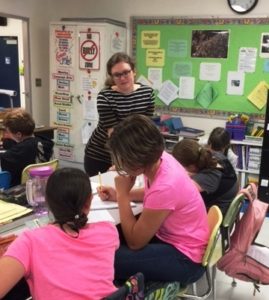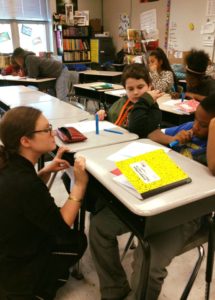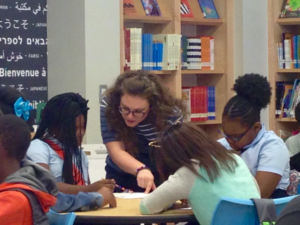by Jessica Baldwin
This fall I worked with over 1,000 Maryland students as they crafted their entries for our student writing contest Letters About Literature (LAL). To enter the LAL contest, students in grades 4-12 write a letter to the author of any book, story, or poem that has changed how they see themselves, others, or the world around them. Writing LAL letters urges participants to connect with literature personally and to reflect on how reading stories from different perspectives affects their own points of view. A few students had entered the contest before, but for most it was a totally new—and sometimes daunting—experience. Some of the educators with whom I worked had been participating in LAL for years, but the majority of educators were using the program in the classroom for the first time. I worked with elementary and middle school students (hopefully, I’ll get to visit some high schools next year!) on the Eastern Shore, in cities from Annapolis to Frederick, in the mountains of Western Maryland, and several places in between. As different as the students, teachers, and schools were, a few common threads stood out as lessons learned. Here’s what I learned from Maryland students during my first year of LAL class visits:
In October I visited Salisbury Middle School and North Dorchester Middle School. The students with whom I worked ran the gamut in age, experience, and literary interests. But I was surprised at how many of my personal favorites were student favorites, too. And the students were shocked to realize that other readers in their school—people with whom they weren’t friends or not even in the same grade—were reading the same books they were! In Mrs. Elliott’s 6th grade classes at Salisbury Middle (pictured), we found common ground talking about identity and family in Anne of Green Gables. During a writing workshop at Dorchester Middle, in which three classes from different grades came together to work on their drafts, two students who had never even met before discussed how Jack Gantos’s Joey Pigza series made them laugh out loud while gaining empathy for their fellow students with learning differences. The kicker? The letter I wrote to use as the workshop sample was all about the first Joey Pigza book, Joey Pigza Swallowed the Key. Lesson learned: Don’t judge readers by their covers! Discussing literature has the power to bring us together in unexpected ways.
I was very fortunate that my LAL travels brought me to Garrett County during Autumn Glory season (pictured). I worked with Northern Middle School and Swan Meadow School as their students strove to write introspective letters with strong reflections and personal details. And even though everyone was focused on writing outstanding letters, their wide-ranging book choices proved how readers can find themselves in just about any book. Students wrote their letters in response to memoirs written by YouTube stars, a series written from an ornery dog’s perspective, the Bible, and historical novels about slavery and pioneer life. Using discussion and interactive activities, classes honed their skills connecting, corresponding, and synthesizing (pictured). And the stronger the students’ skills became, the more they were excited to write! All of my Garrett County classes ended with free time for draft work, in which the quality of the drafts grew by leaps and bounds. Lesson learned: Any book is a good book if it changes how you think. Great LAL letters start with the inspiration we gain from reading.
Baltimore City’s Harford Heights Elementary is participating in LAL for the first time this year. Mrs. Kimbrow, the school’s Library Media Specialist, worked with 5th grade English Language Arts teachers to rearrange their schedule so students could participate in LAL workshops and activities every week from September through December. When I first met Ms. Royal’s and Ms. Taylor’s 5th grade classes, the students had never heard about Letters About Literature. And even though many of them were worried about writing a letter (today is the age of social media and texting, after all!), they enthusiastically jumped in to discussion. The more the students talked about what they were reading, the more parallels they began to draw between their own lives and the lives of fictional characters whose worlds were completely different from their own. Bit by bit, these 5th graders wrote about their connections, linked their connections together to create detailed personal reflections, and added all the trimmings to put their writing in letter format (pictured). In less than a semester, these amazing Harford Heights students grew from reticent writers who worried about not being able to do the assignment to self-possessed communicators ready to share their individual perspectives. Lesson learned: Turns out the old adage “practice makes perfect” is on-point! If participating in LAL seems daunting, try taking it one step at a time and let personal connection lead the way.
The deadline for Level 3 (grades 9-12) entries for the 2017 LAL contest has passed, but there is still time to enter for students in Level 1 (grades 4-6) and Level 2 (grades 7-8). Get the guidelines and entry coupon here. Educators, interested in a FREE LAL class visit or one-on-one consultation next fall? Email me, Jessica Baldwin. We look forward to reading this year’s letters from young Marylanders.
About Jessica Baldwin
As the program assistant for Maryland Center for the Book (MCFB) at Maryland Humanities, Jessica Baldwin provides program and administrative support for MCFB’s five literary annual programs as well as special initiatives. Jessica developed the Writing Center and taught middle school Language Lab at her alma mater, St. Paul’s School for Girls. Using her teaching experience, Maryland State Department of Education coursework, and requests from LAL teachers in Maryland, Jessica developed the LAL class visit pilot offering for fall 2016.
About Letters About Literature (LAL)
For young readers in grades 4–12, our annual writing contest, Letters About Literature (LAL), encourages a love of reading and an appreciation for the power of words and ideas. Sponsored by the Center for the Book in the Library of Congress, this national contest not only promotes reading and writing, but also inspires creativity and encourages young people to be lifelong readers.





